Durch das Solino Kaffee Projekt kam ich auf die Idee, gut ausgebildeten Äthiopiern aus den Universitäten die Selbständigkeit zu ermöglichen. Im November 2008 habe ich deshalb einen „Business Workshop“ geleitet. Die besten Unternehmensideen wurden am Ende ausgewählt.
Damit die Teilnehmer aus Addis Abeba diesen Bericht auch lesen können, geht es jetzt in englisch weiter.
It was my third visit to Ethiopia. I think these are the issues of the country today:
- Farmers represent 80% of the population. Any bad harvest leads to economic crisis and often starvation. This summer was extremly dry and there will probably again be a famine in few months.
- Many well educated Ethiopians do not find interesting jobs after graduation. They often leave the country to search work abroad.
- Especially small start-up companies have no access to capital. The world financial crisis made it even more difficult to get loans in Ethiopia.
- Due to years of international help programs, many Ethiopians are used to free donations. This often leads to passivity and a loss of self initiative.
I decided 6 month ago to teach potential entrepreneurs how to start a business. The best ideas shall be rewarded with a capital participation of up to 50.000€. Supporting specifically clever and well educated people could have a multiplying effect as they would teach others and create jobs.
On Wednesday morning, 22nd of October, I met 20 participants that were carefully chosen out of 300 applications. The GTZ and the ecbp of Addis Ababa advertised the workshop (by the way, thanks a lot specially to Susanne, Percy (both ecbp) and Nebil (First Consult) who helped organize all this) and from the very beginning I was surprised about the clever students in the workshop.
The business ideas were all very different: a coin-laundry operator, a fish farm, a mushroom spawn laboratory, an internet site for real estate, a sms service provider, an industrial oil purification unit, a distillation of eucalyptus oil and a peanut butter factory.
On the first day the participants were quite nervous and did not want to share too much of their ideas. In fact, copying other ideas is frequent in Ethiopia: in one street one could find 30 copy shops, in the next street 25 souvenir shops!
Fortunately, as all ideas were different, the group slowly relaxed. Also, I think that students realized that they could actually learn from each other. Most participants had a scientific education. Often they were focused on all details of their product, sometimes forgetting how to explain the advantage to the customer. Therefore, on the second day (after teaching some basics about writing a business plan), each participant had to present and “sell” his product to the group.
I also spent some time on explaining how to be more focused. Some students wanted to do everything: from growing pigs to smoking ham and running supermarkets to sell the meat….
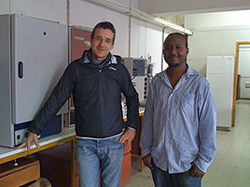
Finally, the best 8 business ideas were presented to a jury: one banker, one consultant and an owner of a coffee roasting and trading house.The criteria of choice were:
- Trust and integrity of the entrepreneur
- Sustainable competitive advantage of the business idea
- A high “Brain / Capital Ratio”. The more the idea was based on a cleverness rather than on capital, the better it was.
- Fit to the current market situation of Ethiopia.
And the 2 winners are:
1. A mushroom spawn laboratory. Actually one cannot buy mushrooms in Ethiopia. However the climate fits well to mushroom growing (some areas are quite humid). With thousands of Chinese living in Ethiopia (they do a lot of infrastructure work in Ethiopia), there are many customers. Convincing Ethiopians to eat mushrooms might be a bit more difficult! Another reason was the very dedicated work of Tilahun Zegeye who did research on mushroom spawn production at the Addis Ababa University and who will manage the company.
2. A Distillation of essential oil. Different kinds of essential oils are needed for pharmaceutics, food and also soap. Although Ethiopia has eucalyptus forests and many other plants, essential oils are imported. Behailu Kebede and his wife Hiwot (who is currently at Dresden University for her Master degree), both educated in forestry, thought about producing essential oils for years. They learned a lot from the workshop and adapted the initial plan by reducing the amount of capital required.
It was hard to pick the two winners. At least 8-10 students had plans that were worth investing. But I wanted to concentrate on only two companies.
After finishing the workshop I only had 3 days to get these two companies started and to make sure that they would receive my starting capital of about 25.000€ each.
Initially we were looking for a lawyer to do the registration. But his fee was a bit too high (almost all white people are asked to pay more: for taxis, lawyers or any other services). Surprisingly we managed to get the companies registered by using the templates of the Ethiopian investment agency.
The two founders now own each about 65% in their companies and I 35%.
I am very sure they will both succeed and create new qualified job opportunities.
And of course I hope, that this could be an example for others to invest in small businesses in Ethiopia.
I believe this is more efficient and helpful than the donations we usually send to developing countries.
PS: Of course I also met the Solino coffee roasters in Addis Ababa. I tasted again excellent coffee! Currently the coffee is harvested in Ethiopia and will be on the market in December.

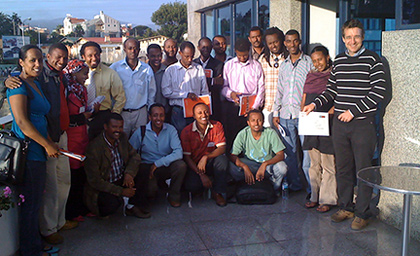
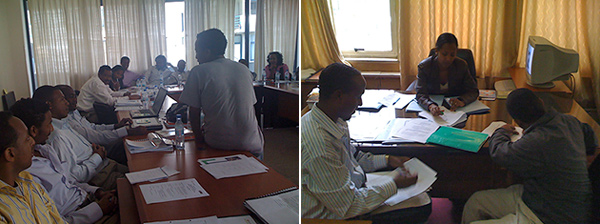
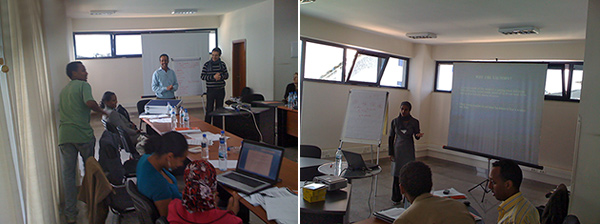
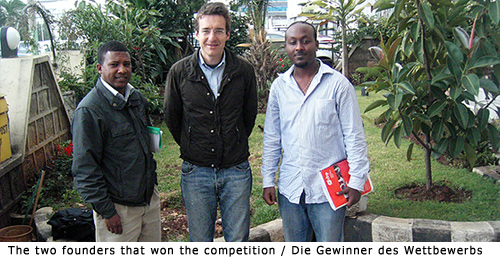
Pingback: Äthiopischer Gründerwettbewerb von Solino
Hello everbody,
I am Tilahun Zegege and one of the two winners in the business plan training workshop held at Addis Ababa, Ethiopia. First of all, such kind of trainings are very important to develop enterprenuership skills for anyone starting a business. Personally, I am very lucky to be part of such a workshop and also would like to thank Mr. Felix Ahlers who took such a great intiative to share his knowledge and experience with us and also help us to realize our business ideas. Once he said ” we can be partners with Ethiopia” and his effort can be a good example for any investor in Germany or anywhere else in the world. Engineering Capacity Building Program (ecbp) and Fist Consoult should also continue such kind of activity to help develop businesses in our country. Finally, I would like to say Ethiopia is a country with full of potential and unexploited businesses, whcih will make any carefully thought investment worth something.
Dear Behailu and Hiwot. Congra!! I am very to hear that you have such kind of PLC. I wish you all my best !
. .es ist wirklich gute Idee, die das Einkommen verursachen könnte, das Gelegenheit für beide Parteien ….. eine Art Gewinngewinnsituation erzeugt. Ich bin sicher, daß es ein symbot für andere westliche Investoren sein würde, denen anziehen sie zu und einen bilateralen Profit bearbeiten könnte das Bilden des Jobs im Land….Äthiopien…, das noch ist, kann ich sagen, in bezug auf Hilfsmittel, vergin Land
i have got this link from Behailu kebede, the winner on distillation of essential oil.it is realy wonderful business plan.
Ambachew
I am Behailu Kebede. Born on the 28th of December 1977, I attended elementary and junior secondary school in Addis Ababa. In 1994 I joined the Wondo Genet College of Forestry here in Ethiopia to complete a Bachelor of Science Degree in Forestry and I am a forester. In 1992, I joined a district office of agriculture as an expert of forests and wildlife to work for 2 years. On November of 1994, I joined the Ethiopian Agricultural Research Institute (EIAR) to work for the last six years and the same institute sponsored my Master of Science study in Farm Forestry at Hawassa University which I completed in 2006. Currently I am an Employee for the Ministry of Education at Wolita Soddo University as a teaching and research staff.
In a recently past my wife (studying for a Master of Science Degree at Dresden Institute of Technology in Germany) and I competed for a start up capital the idea revolving around the production and marketing of essential oils. There are many good ideas and the resources but the most limiting factor for these ideas to materialize is the lack of small start up capital in Ethiopia. Luckily, we found the way out in a form of Mr. Felix Ahlers an entrepreneur and a vice president for sales of FRoSTA. Currently I am managing the company called Abyssinia Essential Oils PLC and we are now on the first phase of establishing the company which involve ordering of mobile distillation units, trailers and leasing of a forest for its leafs. I hope it will all go as planned.
This kind of ventures as demonstrated by Mr. Felix Ahlers is a new way of doing things and a new way in my opinion to reach and touch the life’s of others in a positive way much effective than ‘aid ‘ to developing countries which has been an order for quite long time. I believe creating a reasonable chance for peoples to succeed is better and please come and explore the potential of Ethiopia and change the lives of many for less!
Hallo Herr Ahlers,
wundervoll, das ist genau der richtige Weg!
Schön, dass es Leute wie Sie gibt, die sich verantwortungsvoll Gedanken machen zum Thema ‘Hilfe zur Selbsthilfe’ und auch aktiv werden.
Letztlich haben sicher alle Teilnehmer ‘gewonnen’ in diesem Projekt!
Welche Erfahrung haben Sie für sich mitgenommen aus den zwei Wochen ? Ich stelle es mir ein wenig abenteuerlich vor,(weniger im romantischen Sinne) ich meine, Sie hatten sicher einen Plan von den zwei Wochen und Ihrem Vorgehen?
Ist denn ein Follow up geplant ?
Wie sind Sie denn zu dem Solino Kaffee Projekt gekommen ?
Verzeihen Sie mir, viele Fragen, aber bin neugierig da ich vor einigen Jahren in Südamerika bei einem ähnlichen Projekt mitgearbeitet habe und ich diese Arbeit sehr wertvoll finde und sie auch einfach Spass macht!
Beste Grüße
Hallo Sonja, danke für das Interesse! Ja, es soll weiter gehen wir suchen gerade nach weiteren Investoren um diese Art von Workshops regelmäßig zu wiederholen.
Ich bin eher zufällig auf Äthiopien gekommen – durch eine Reise in das Land und einigen Gesprächen mit Leuten von dort.
Und ich hatte das Gefühl: hier kann man wirklich etwas machen!
Als ich dann rausgefunden habe, dass die EU seit 1960 versucht sich vor veredelten Produkten aus Afrika “zu schützen” durch Zollsätze (z.B. auf gerösteten Kaffee bis 2007) habe ich entschieden dieses Thema einfach einmal bekannt zu machen.
Wir geben viel für Hilfe aus, allerdings wenn es darauf ankommt die Länder zu fördern und ihnen auch unsere Märkte zu öffnen, dann hat der Spass ein Ende und wir schotten uns ab.
Leider ist das in der Öffentlichkeit noch unbekannt.
Viele Grüße, Felix
Danke Felix für die Rückmeldung!
Ja grossartig! Ich hoffe und wünsche dass sich das umsetzen lässt…….und ich mache mir auch ein paar Gedanken dazu!
Wie verfolgen Sie was in den Start-up’s passiert oder wo sie vielleicht Hilfe, in Form von Beratung benötigen würden ?
Nun das Thema Entwicklungshilfe ist recht komplex und nicht einfach mit richtig oder falsch zu beantworten.
Organisationen wie die GTZ leisten eine so wirklich wichtige und ernsthafte Arbeit zu diesem Thema. Der Reformprozess bezogen auf politische Veränderungen, eine Unterstützung der benachteiligten Bevölkerungsgruppen und der Versuch eine gesunde Balance zwischen finanzieller Unterstützung und Beratung und Begleitung der Menschen ist leider mangels Werbewirksamkeit nicht sehr oft ein Thema in den Medien.
Sicher ich kaufe Wasser und spende für Brunnen in Afrika oder trinke Bier und rette den Regenwald etc. doch Sie haben Recht, wir bekommen schnell Angst wenn unser Einfamilienhaus und der Mercedes mit der Garage in Gefahr zu sein scheint….und dass viele Hilfsorganisationen und sogar die EU durch Zölle eine ‘ja bitte nicht zu selbständig werden’ Form von Entwicklungshilfe betreiben ist traurig und irgendwie zynisch.
Gibt es Solino in einem Cafe in HH ?
Hello Mr. Ahlers, hello @all.
My English is very bad, sorry.
I’m said: It’s a wunderful Projekt – thanks for this.
The best wishes,
Schnuppi
@ Sonja: auf jeden Fall! Gibt es bei uns schon im FRoSTA Bistro direkt am Rathausmarkt: http://frosta.de/index2_bistro-anfahrt.html.
Und bald machen wir auch ein paar Aktionen bei EDEKA Struve in Hamburg! Viele Grüße, Felix
Ja danke, hatte ich gelesen auf der Solino Seite, ich dachte evtl. an einen Bio-Laden/Cafe.
Gibt es in nächster Zeit Veranstaltungen bei denen Sie über Ihr Äthiopien Projekt erzählen ? bzw. haben Sie Unterlagen für Sponsoren und Interessenten die man bekommen kann ? Wendet man sich direkt an die GTZ ? Oh weh, schon wieder fragen über fragen…..wünsche ein schönes Wochenende,Sonja
Dears,
It is great to read that we are about to have a company that distils essential oils in Ethiopia. I lookforward to see the the project successful.
O lala!!
a nice start
congrat Bayu and Tile. I am pleased to hear your sucess
hope I will read more in the near future.
I am sure and confident on both of you that you will be
a good model for many of us.
See you on “SIKET” TV show sooooooon
Hallo Herr Ahler,
Ihr Projekt ist sehr lobenswert, doch Ihr Kaffee kommt nicht aus dem Regenwald. Den gibt es weder in Sidamo und Yirgacheffee ist in Sidamo und schon gar nicht in Harar. In Äthiopien baut man Gartenkaffee an. Das heißt die Kaffeebauern haben einen Garten meist so 4000qm, da wächst meist Enset, Kaffee Bananen und Mango. Es regnet zwar relativ oft in Sidamo und es ist auch sehr grün aber mit einem Regenwald in Sumatra, Brasilien oder in Costa Rica ist das alles nicht zu vergleichen. In diesen Regenwäldern wächst auch Kaffee.
Meine Frage ist jedoch wie sinnvoll ist es das fertige Produkt zu importieren, ist da nicht der Einfuhrzoll deutlich höher. Der Preis für den Kaffee halte ich für zu hoch. Wenn die importierten Mengen nicht hoch genug sind hilft es keinem. In Belgien kostet Sidamo Kaffee im Supermarkt die Hälfte.
Hallo Herr Ahler,
Ihr Projekt ist sehr lobenswert, doch Ihr Kaffee kommt nicht aus dem Regenwald. Den gibt es weder in Sidamo und Yirgacheffee ist in Sidamo und schon gar nicht in Harar. In Äthiopien baut man Gartenkaffee an. Das heißt die Kaffeebauern haben einen Garten meist so 4000qm, da wächst meist Enset, Kaffee Bananen und Mango. Es regnet zwar relativ oft in Sidamo und es ist auch sehr grün aber mit einem Regenwald in Sumatra, Brasilien oder in Costa Rica ist das alles nicht zu vergleichen. In diesen Regenwäldern wächst auch Kaffee.
Meine Frage ist jedoch wie sinnvoll ist es das fertige Produkt zu importieren, ist da nicht der Einfuhrzoll deutlich höher. Der Preis für den Kaffee halte ich für zu hoch. Wenn die importierten Mengen nicht hoch genug sind hilft es keinem. In Belgien kostet Sidamo Kaffee im Supermarkt die Hälfte.
@ D. Abebe: Danke für Ihren Kommentar. Mit der Bezeichnung Wald Kaffee oder Regenwaldkaffee bin ich inzwischen auch nicht sicher. Es gibt dafür in Europa keine gesetzliche Regelung. Am einfachsten ist wohl die Bezeichnung “Arabica Kaffee” und am Ende kommt es ja hauptsächlich auf den Geschmack an!
Zu Ihrer Frage: der Einfuhrzoll wurde in der EU seit 2007 auf 0% gesetzt, auch für gerösteten Kaffee. Bis 2007 galt noch ein Zollsatz von 30% auf gerösteten Kaffee.
Es geht bei dem Solino Projekt ja gerade darum, Äthiopien an der Wertschöpfung des Kaffees teilhaben zu lassen! Dies nützt dem Land auf jeden Fall, oder nicht?
Zur Zeit sind die Mengen noch klein, deshalb ist auch der Transport teuer. Aber wir arbeiten daran, die Menge zu steigern und es wird auch monatlich mehr.
What is going on in Ethiopia now is not development but “ZIRFIA”/ROBBERRY like Jelzin Russia. A sustainable development requires a sustainable Government i.e free transition of power. What happened to all the development assistance for Somalia, Iraq, Zimbabwe? If you really care for Ethiopia and Ethiopians say no to tyranny.
Guten Abend,
Mein Name ist Tadu Alemu. Ich lebe in Berlin.
Beruflich bin ich Europian Tourismus Assistentin, und bin in meinem Leben ziemlich viel gereist. Mein Herz ist allerdings in Äthiopien. Geboren bin ich in Addis Abeba in der Nähe von der amerikanischen Botschaft.
Ich habe gute Ideen, und habe mit Kenenisa darüber geschprochen. Wie ich mitgekriegt habe, zieht er das alleine durch.
Da ich viel mit Sport zu tun habe, hatte ich auch mit Haile G/Silassie gute kontakte und gute geschäftliche geschpräche. Er wird auch ende August wieder in Berlin sein, ein sehr beschäftigte Mann!
Es ist schwerig ihn zu erreichen, von hier aus meine ich.
Wenn ich nur einen interessierten Investoren treffen könnte währe es eine gute Tat für uns alle. Bitte, wenn sie Interesse haben, melden sie sich unverzüglich.
Danke für ihr Interesse und Verständniss.
Tadu Alemu. Berlin
Hallo Herr Ahlers,
Glückwunsch zu der tollen Aktion des Gründerpreises! Ich selbst habe vor einigen Wochen mit Tilahun Zegaye gesprochen, da ich im Rahmen eines GTZ-Projektes Einkommen schaffende Aktivitäten in sensiblen Waldrandgebieten eruiere und konzipiere. Die Pilzzucht könnte in diesem Zusammenhang eine wichtige Innovation darstellen, die wir in jedem Fall genauer prüfen werden. Vielleicht finden wir mit Ihnen und Tillahun wichtige Partner, um Kleinbauern in ländlichen Regionen zu neuen Einkommensquellen zu verhelfen. Vielleicht sind diese Baurn in Zunkunft auch mal Zulieferer für die Frosta AG.
Beste Grüße
Jörg Volkmann
Ein spitzenmässiges Projekt, herzlichen Glückwunsch dazu, das gefällt mir.
[Anm. Solino-Coffee: In diesem Blog sind Spam-Links nicht erwünscht. Darum wurde die URL entfernt!]
Wirklich ein informativer Blog, werde bestimmt noch das ein oder andere mal hier reinschauen! Deine Posts sind auch echt klasse! Lieben Gruss
[Anm. Solino-Coffee: In diesem Blog sind Spam-Links nicht erwünscht. Darum wurde die URL entfernt!]
Da kann man nur weiterhin viel Erfolg wünschen, das schaut gut aus. Eine tolle Idee.
[Anm. Solino-Coffee: In diesem Blog sind Spam-Links nicht erwünscht. Darum wurde die URL entfernt!]
Darf ich fragen, wie heisst den das verwendete Theme hier? Ich hab es schon mal wo bestaunt und würde das Theme selbst bei meinem Blog nutzen.
[Anm. Solino-Coffee: In diesem Blog sind Spam-Links nicht erwünscht. Darum wurde die URL entfernt!]
Hallo Felix, ich las gerne Deinen Beitrag – bin jetzt (unter anderen) DaF Lehrer im Ausland (Tschechien)
Hallo Irene, was ist denn DaF? Woher kennen wir uns?
Super Projekt, finde ich klasse, dass sich jemand in diesem bereich so außerordentlich engagiert. Weiter so und viel Erfolg auf der Suche nach Investoren.
Lg
[Anm. d. Admin: Werbelink gelöscht. Keine Keywords als Namen bitte!]
Wollte dir bloß mitteilen, daß irgend etwas mit dem RSS Feed nicht stimmt. Wenn ich den Weblog abbonieren will, wird mir bloß ein Blogthema angezeigt und jedes mal wenn ich das RSS Symbol wieder klicke, wird mir ein neues Thema angezeigt. Ich hoffe das hilft weiter.
I stumbled up on this website by accident and was pleasantly surprised by its content. As an Ethiopian expatriate living in North America, I’ve been preaching about the need to expand manufacturing in every sector. A country can’t grow out of poverty by exporting raw material and importing the value added product paying ten times more than it received for selling it. Roasting, grinding, and attractively packaging coffee for export from its source shouldn’t be difficult. However, it requires capital, a good marketing muscle, and a skilled labor. I work for one of the largest coffee roasters in the world with huge market share in North America. I see imported green beans from Yirgacheffe, Harar, Sidamo…every day, and I ask my self how much is the farmer who has struggled to raise his/her family getting for this back breaking job. Using great technology we’ve turned coffee in to an amazing and diversified product that has become the favorite drink of the every day man. But most of the benefit goes to who ever adds the most value to this ancient product. Coffee is a good example but it’s indicative of the difficulty developing countries face. Whether it’s mining in Congo or Zambia or Coffee and leather in Ethiopia the problem of growth and poverty alleviation can only be dealt with by expanding the manufacturing sector in Africa and investing a good deal of capital in its success is the real solution. Aid is important but as a long term solution it creates dependencey and a psychological inferiority that’ll have long term consequences. I would like to congratulate Felix for his efforts to teach Ethiopians entrepreneurship and capital formation for growth. As the saying goes It’s better to learn how to fish than receive a fish.
An economist is an expert who will know tomorrow why the things he predicted yesterday didn’t happen today.-Laurence J. Peter
[Anm. Solino: Spam-Link entfernt, Name in “Gast” geändert.]